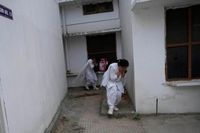NEW DELHI (AP) — In a dramatic escalation of tensions, India and Pakistan are responding to a crisis triggered by a massacre in Indian-controlled Kashmir, which has raised fears of a renewed conflict between the nuclear-armed rivals. On May 7, 2025, Pakistani officials reported that India fired missiles striking three locations inside Pakistani-controlled territory, while India claimed it was targeting militant infrastructure.
India holds Pakistan responsible for backing the gunmen behind the April 22 attack that killed 26 people, mostly Indian Hindu tourists, describing it as a terror attack. Islamabad has vehemently denied these accusations, leading to a tit-for-tat diplomatic fallout. Both nations have expelled each other's diplomats and nationals, closed their borders and airspace, and India has suspended a critical water-sharing treaty with Pakistan.
World leaders have since called for de-escalation, urging both sides to avoid further military confrontation. Senior officials from the U.S., China, Russia, and Saudi Arabia have all pressed for restraint. Iran has even offered to mediate the conflict. Harsh Pant, head of foreign policy at the Observer Research Foundation in New Delhi, noted that India's diplomatic outreach has been extensive, aiming to showcase evidence of Pakistan's involvement in the attack.
In response, Pakistan has offered to cooperate with an international investigation into the attack and has reached out to foreign diplomats, asserting it will match or exceed any military action taken by India. The Indian army has reported that its troops have exchanged gunfire with Pakistani soldiers along the Line of Control in Kashmir for ten consecutive nights, with each side accusing the other of unprovoked firing.
As tensions rise, Indian forces have launched a massive operation in Kashmir, detaining more than 2,000 individuals and destroying at least nine family homes of suspected rebels. This crackdown has sparked fear and anxiety among the local population, with senior analyst Praveen Donthi from the International Crisis Group stating, "Kashmiris are always the first to bear the brunt of any political or military tensions between India and Pakistan." He added, "The collective punishment imposed on Kashmiris and the state violence unleashed against them further inflames the conflict."
The situation escalated further on May 6, 2025, when India conducted what it described as "precision strikes" in Pakistan, targeting nine sites it claimed were terrorist camps. Pakistan's military reported that three locations were hit, including two in Pakistani-run Kashmir and one in Bahawalpur, Punjab. The strikes resulted in civilian casualties, with reports indicating that at least eight people, including a child, were killed and 35 others injured.
Lieutenant-General Ahmed Sharif Chaudhry, a spokesperson for Pakistan's military, condemned the strikes as a "heinous provocation," while Prime Minister Shehbaz Sharif labeled them as cowardly attacks. He vowed that Pakistan would retaliate at a time of its choosing, asserting that his country has every right to respond robustly to what he termed an act of war.
In the wake of these events, Indian Prime Minister Narendra Modi has stated that India will "identify, track and punish every terrorist and their backer" involved in the attack at Pahalgam. Indian police have issued wanted posters for three suspects, two of whom are believed to be Pakistanis associated with the militant group Lashkar-e-Taiba.
The international community remains deeply concerned about the potential for escalation. UN Secretary-General Antonio Guterres has called for maximum restraint from both nations, emphasizing that the world cannot afford a military confrontation between India and Pakistan. U.S. President Donald Trump expressed hope for a swift resolution to the clashes, recognizing the long-standing conflict between the two nations.
In a show of military strength, Pakistan's military has conducted missile tests in recent days, including a surface-to-surface missile with a range of 450 kilometers, capable of reaching New Delhi. Concurrently, India's navy has also test-fired missiles, indicating a heightened state of readiness on both sides.
As the situation evolves, India is set to hold civil defense drills to prepare its citizens for potential hostilities. Iranian Foreign Minister Abbas Araghchi is expected to visit New Delhi, marking the first senior foreign diplomatic visit since the April 22 attack, further emphasizing the international dimension of this crisis.
The longstanding conflict between India and Pakistan has its roots in the disputed region of Kashmir, where insurgency has plagued the area since 1989. Despite numerous attempts at peace, the two nations have fought multiple wars since their partition in 1947, and the recent events have reignited fears of a larger confrontation.
In a recent statement, Modi warned that water flowing from India into Pakistan would be stopped, following the suspension of the 65-year-old Indus Waters Treaty, which governs the sharing of crucial water resources. This move has been interpreted as a significant escalation, with Pakistan warning that tampering with the rivers would constitute an "act of war."
As both nations brace for further developments, the world watches closely, hoping for a resolution to this increasingly volatile situation.




